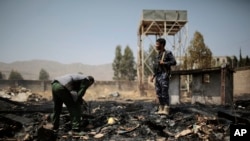Six months ago, the United Nations brokered a truce between the warring parties in Yemen. The truce resulted in the longest period of relative calm since the current conflict began eight years ago, decreasing casualties by 60 percent. It enabled over 29,000 Yemenis to seek medical care and reunite with loved ones abroad via commercial flights from Sanaa’s airport and allowed five times more fuel via the ports on the Red Sea, facilitating the delivery of much-needed supplies. However, the truce expired on October 2, and the Houthis have rebuffed attempts by the United Nations to extend and expand these benefits for the people of Yemen.
Yemen is diverting from the path to peace due to Houthi inflexibility, who failed to accept the UN-mediated truce proposal, said Deputy U.S. Representative to the United Nations Richard Mills.
“It is the Houthis who must take action to prevent further suffering and enable even greater benefits for Yemenis under an expanded truce agreement. They have a moral responsibility not to deprive Yemenis of these benefits...”
Nonetheless, “[t]he United States is encouraged that the parties largely continue to abide by the terms of the truce, and that U.N.-led negotiations are continuing,” said Ambassador Mills.
“At a time of global turmoil and division, there is a remarkable international consensus in support of the U.N. truce: there is no military solution to the conflict in Yemen. An inclusive, durable peace agreement remains the only option to prevent more suffering for Yemenis, a resurgence in civilian deaths, and a deeper humanitarian crisis.”
“We hope the Houthis do not reject the pleas of the Yemeni people for peace and ignore the international consensus to extend the truce. Rather, we urge them to engage in good-faith negotiations to ensure an inclusive, durable peace in Yemen,” said Ambassador Mills.
“The Houthis have a historic decision to make, one that will be remembered for generations to come. Did they –- when they had the chance -– choose peace and prosperity for their people or did they choose to continue a cycle of pointless destruction, relentless violence, and economic deprivation that has plagued Yemen for the last eight years?”
“We stand ready, with the rest of the international community, to support Yemen’s path to an inclusive, durable peace settlement and subsequent recovery efforts,” said Ambassador Mills. “But it is up to the Yemeni parties, and specifically the Houthis, to choose peace.”














